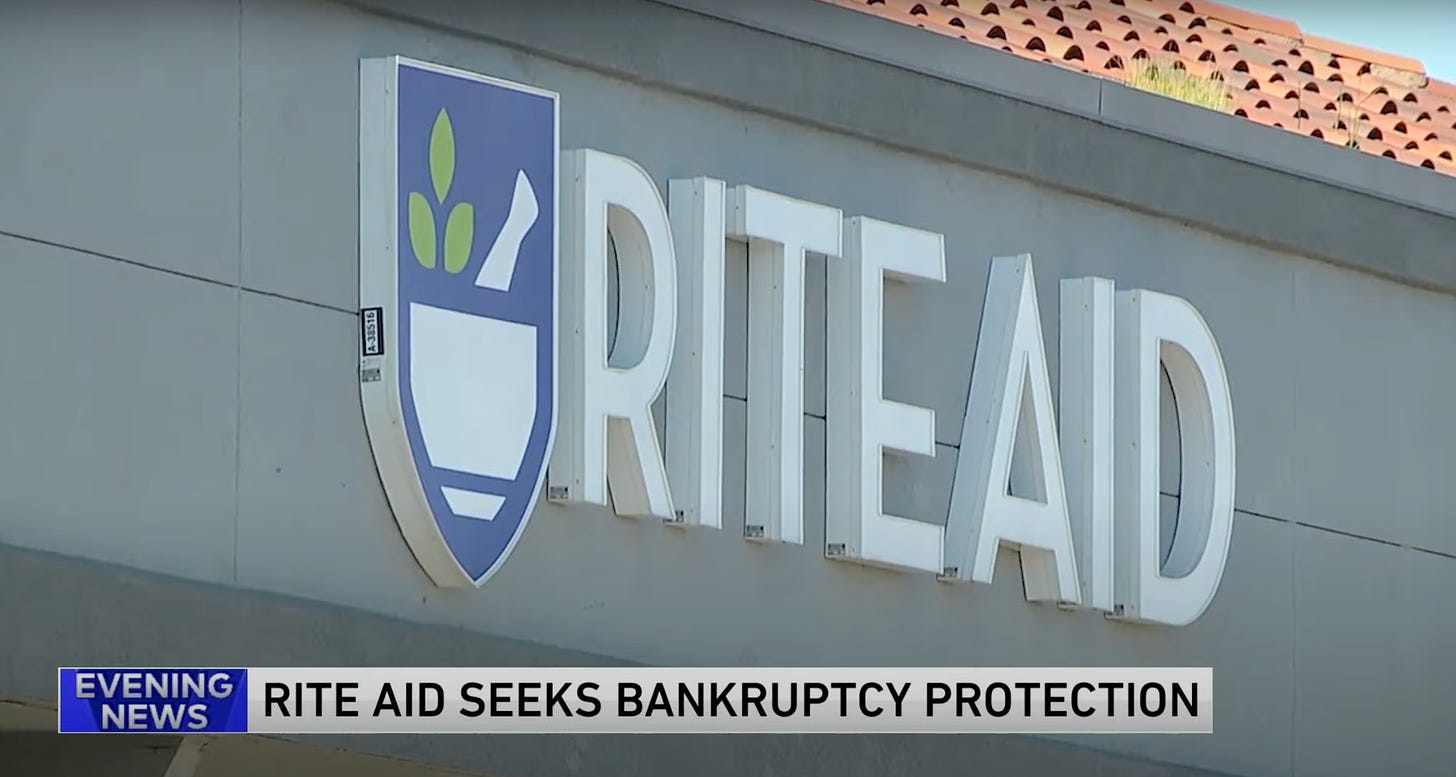
Discover more from Wonkette
Rite Aid Declares Bankruptcy, Putting Tragic End To No-Questions-Asked Prescription Service
Struggling retailer closing stores across the country.
Rite Aid filed for bankruptcy Sunday in New Jersey, and no it’s not because of shoplifting. The drugstore chain was hit with hundreds of federal, state, and private lawsuits alleging it oversupplied prescription painkillers to desperate people.
The Wall Street Journal reports:
From May 2014 until June 2019, the federal government claims Rite Aid “filled at least hundreds of thousands of unlawful prescriptions for controlled substances that were medically unnecessary, lacked a medically accepted indication, or were not issued in the usual course of professional practice.”
Rite Aid settled last year for $30 million to resolve some of these suits, but apparently struggled to come up with less cash than the Taylor Swift concert movie made in one day.
Declaring bankruptcy puts all the outstanding suits on hold and is part of an overall “restructuring plan” made in concert with its creditors. Rite Aid said in a statement that this plan will “significantly reduce the company’s debt” while helping to “resolve litigation claims in an equitable manner.”
Sunday, GlobalData retail analyst broke down Rite Aid’s broke-ass financial position. The retailer has lost more than $2.9 billion over the past six years and has amassed $3.3 billion in long-term debt.
“Against this financial backdrop, Rite Aid simply isn't a viable entity,” Saunders said. “It is basically running on the fumes of cash it generates in the day-to-day business.”
Rite Aid sang a song of woe in its bankruptcy filing, noting that it’s been burdened with dead rent costs from underperforming stores and had to close more than 200 locations recently.
However, after a failed merger with Walgreens in 2017, Rite Aid sold Walgreens 2,000 of its stores — almost half — and three distribution centers for $5.18 billion. This was supposed to leave Rite Aid with its “best performing locations.” Then CEO John Standley called this an “important strategic transformation.” He’d later move on to the top job at Walgreens, which also suffered significant losses. Standley was honored in January for his “life’s work in the retail industry.”
Rite Aid briefly experienced that elusive concept known as “success” during the early days of the pandemic when everyone was stocking up on hand sanitizer and cleaning supplies. This didn’t last long, as social distancing and mask wearing resulted in a less severe cold and flu season in 2021. Heyward Donigan, Rite Aid’s chief executive at the time, lamented the drop in the company’s cough, cold and flu business.
“We just didn’t realize how evaporated that business actually would be,” Donigan said.
The flu eventually returned with a vengeance, but that wasn’t enough to save Rite Aid or most other physical retailers who were taking it on the chin from Amazon. The Department of Justice delivered the perhaps well-deserved killing blow in March when it filed a complaint in accord with a whistleblower lawsuit brought under the False Claims Act (FCA).
“We allege that Rite Aid filled hundreds of thousands of prescriptions that did not meet legal requirements,” said Associate Attorney General Vanita Gupta. “According to our complaint, Rite Aid’s pharmacists repeatedly filled prescriptions for controlled substances with obvious red flags, and Rite Aid intentionally deleted internal notes about suspicious prescribers. These practices opened the floodgates for millions of opioid pills and other controlled substances to flow illegally out of Rite Aid’s stores.”
Rite Aid wasn’t so much a pharmacy as a dealer.
The retailer’s glide path to oblivion will impact 45,000 employees — 6,100 of whom are pharmacists. At least 150 locations are targeted for closure across 15 states. This will also contribute to more pharmacy deserts, which are neighborhoods with an average distance to the nearest pharmacy of one mile or more.
If you’ve started your holiday shopping early, Rite Aid stock is down almost 80 percent since January.
WSJ / CBS News / New York Times
Follow Stephen Robinson on Bluesky and Threads.
Subscribe to his YouTube channel for more fun content.
Catch SER on his podcast, The Play Typer Guy.


















About a year ago, I got diagnosed with an exotic disease and my incredibly shitty PCP transferred me to a nonprofit specialty practice that cured me. I've never had such good health care. I have a case manager who coordinates with all the specialists, even my dentist. There's an onsite lab and pharmacy. They keep track of my vaccines and incorporate them into appointments. They reach out to me online if they feel like I should be on top of something, and I can ask questions and get them answered online right away. And they're all young and beautiful and enthusiastic. The pharmacists all could be social media influencers, they're so hip and gorgeous. Everyone from the front desk to the medical staff is also very sweet and inclusive and nonjudgemental. There are Pride flag banners in all the exam rooms and the staff wear pronoun stickers. Almost worth the life threatening illness to get such a good deal?
They deserve it for the opioid thing alone. Burn its ashes.
I work in corporate crisis management for a living. We have a saying: Sometimes you have a PR problem. Sometimes you have a problem.
They have problems.
I really just wish some people would go to prison for this shit.